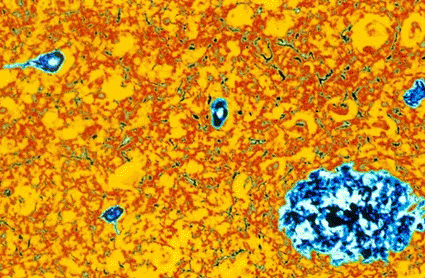Service Launched for Measuring Abeta Plaques in AD Patients
By LabMedica International staff writers
Posted on 20 Jul 2009
A diagnostic test quantitatively measures amyloid in the brain of Alzheimer disease (AD) patients months earlier than the current microscopic approach. A company focused on treatments for brain-wasting diseases has launched a diagnostic service using this test.Posted on 20 Jul 2009
Aggregated misfolded proteins are a common element of many brain-wasting diseases. The ability to identify AMPs and understand their structure and mechanism of folding are the first steps to developing new treatments for these devastating diseases.

Image: Colored light micrograph of brain tissue from an Alzheimer’s disease patient, showing a large plaque (blue) containing the abnormal protein amyloid (Photo courtesy of Simon Fraser / SPL).
The hallmark of Alzheimer's disease (AD) is the aggregation and accumulation of beta-amyloid as plaques in the brain. Amorfix Life Sciences (Toronto, Canada) presented a paper on the new beta amyloid (Abeta) assay at the International Conference on Alzheimer's Disease (ICAD; 2009) on July 15, 2009 in Vienna (Austria), thereby launching the company's AD diagnostic service.
The Abeta assay is significantly more sensitive than current detection methods and can be used in high-throughput applications designed to study the inhibition of amyloid formation. Dr. George Adams, CEO of Amorfix, said, "There are over 300 companies and thousands of researchers studying AD and seeking new treatments, who could benefit from this sensitive and specific test for beta-amyloid."
The aggregated-amyloid assay can detect beta-amyloid (Abeta) in standard animal models of AD several months before conventional microscopic procedures, and can therefore accelerate the preclinical screening of new drugs for the disease.
Amorfix Life Sciences is a theranostics company, which develops therapeutic products and diagnostic devices targeting brain-wasting diseases including amyotrophic lateral sclerosis (ALS), Alzheimer's disease, Parkinson's disease, and variant Creutzfeldt-Jakob disease (vCJD).
"We are very pleased with the initial response from the pharmaceutical and academic communities to our amyloid testing service," commented Dr. Adams.
Amorfix's lead programs are a diagnostic blood screening test for vCJD and a therapy for ALS.
Related Links:
Amorfix Life Sciences













